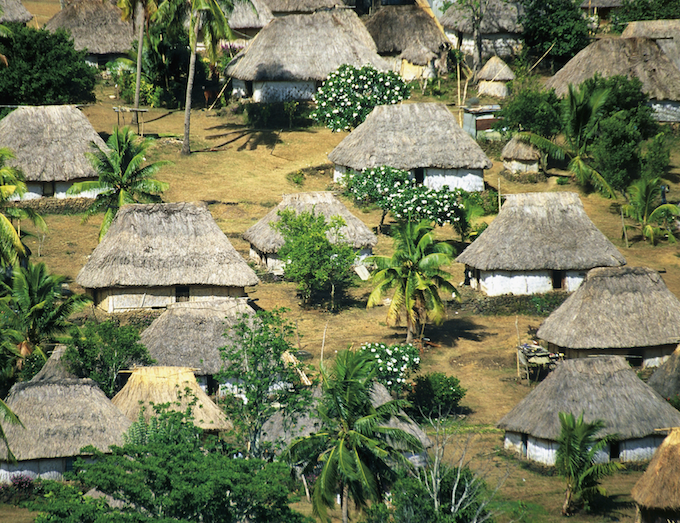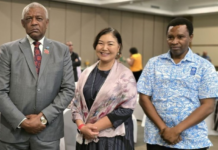ANALYSIS: By Professor Biman Prasad
It has been interesting to read about Fiji Prime Minister Voreqe Bainimarama’s intentions on COP23 (Conference of Parties 23) in his 2017 new-year message. This seems to have beeen the first “official” comment on the COP23 presidency which has thus far been shrouded in secrecy.
The narrative
It is noteworthy that there was no communications or consultations nationally, regionally or internationally as Fiji lobbied to get the presidency for COP23 in Marrakesh. Even our fellow members of the Pacific and SIDS (Small Islands Developing States) were caught unaware.
A robust consultation nationally would have helped government appreciate the gravity of the task which Fiji as a nation was committing to, both in terms of the costs of undertaking this and our capacity to do so.
Coming straight after Severe Tropical Cyclone Winston, as many of our citizens are still struggling to get their lives together, a legitimate question is whether this should be really our priority. This has been further exacerbated by the recent revelation of over F$11 million costs because of the recent floods.
Does the government have the resources for accepting such an extravagant international agenda, when nationally it is in dire need of resources to assist with the recent disasters?
The government should be open and reveal details such as the expected costs and arrangements of hosting both the UNFCCC (United Nations Framework Convention on Climate Change) COP23 and the Oceans Conference and the cost of consultants if any. Aren’t these fundamental values; openness, transparency, inclusiveness in the UN ways of doing things?
It is extraordinary that Fiji has opted to take the leadership on two of the most important issues on the international agenda for 2017. The taxpayers of this country have a right to know how much of their money is being spent on these commitments, especially when the wealthier members of the Asia-Pacific group opted not to take on this responsibility.
The PM talked effusively about his “need” to travel the world and host pre-COP meetings. This comes at a significant cost to the nation when the leader of our executive branch takes (not seeks) approval by way of a New Year’s message, to traipse all over the world.
Fundamentally, citizens and taxpayers of this country, must to be consulted extensively on what positions we are taking on many of the vexed issues within the climate change and oceans agenda with a clear view in mind of the benefits to us or in economic terms, the return on investment. After all it is still unclear what tangible benefits we derived from the chairmanship of the G77 and recently the SBI within the UNFCCC.
Now that Fiji has cajoled the UN membership into taking on this huge privilege and responsibility for the COP23 presidency, the National Federation Party will advocate that this critical issue of climate change and environmental leadership is only possible through genuine and meaningful partnership, backed by a strong track record at the national level.
As members of the Opposition, we will strongly advocate for transparency in multilateral environmental negotiations that should, in the first instance, be taken to the people’s house for robust debate and scrutiny
We offer the following observations.
COPs: Unravelling
The ‘technicalese’
It is widely recognised that COP23 will be a “technical” COP where work on the “rule book” for implementing the Paris Agreement will continue. We also know that the technical capacity within government is extremely limited.
Does the Climate Change Unit, now situated in Ministry of Economy have the required expertise to deal with this issue? Perhaps the Prime Minister’s office and the Ministry of Economy should consider where the Climate Change Unit should be based, given the COP23 will be handled by the PM’s office.
It becomes manifestly evident that the move of climate change to the Ministry of Economy is with one objective in mind — to access global climate change funds. If this is the mind-set which is the driver of our engagement at these negotiations, it is a zero sum game.
The much lauded Green Growth framework that was echoed at the PIDF (Pacific Islands Development Forum) and again in the 2016/2017 Budget supplement remains glaringly non-existent at the implementation level. High-level narratives can no longer cut it.
The strength of our participation in our negotiating bloc AOSIS (Alliance of Small Island States), which corralled the world into the acceptance of the 1.5 degree benchmark has been because of the strength and exceptionalism of our technical arguments, driven by our environment ministries and their performance on our reporting obligations.
All of which were based on science and research. It isn’t the cutting edge science alone that won these debates, but rather the ingenuity of our technical specialists in putting forward suggestions that AOSIS members had to work with, based on our limitations.
Over the years, Fiji’s contributions in the negotiations has been almost non-visible as is evident from the lack of communications to UNFCCC Secretariat on matters seeking parties’ views, the dearth of Fiji participants taking the lead on any of the technical issues on behalf of AOSIS (in spite of a delegation size of over 40 — one of the highest from any developing country!) and our abysmal record in terms of fulfilling our reporting obligations under the UNFCCC. The fact that Fiji’s INDC report, supported by off-shore technical assistance reached the UNFCCC late, is telling.
Fiji cannot claim to be impoverished by a lack of intellect on climate change. There are many individuals, civil societies and institutions who are experts on climate change and multilateral environmental fora and who would only be willing to provide assistance, if they are politely requested to.
Indeed, if the mantra of this government on trade is to “Buy Fiijan Made”, this should surely also extend to our local knowledge and expertise that we should be aggressively promoting if we are sincere about COP23 being Fijian made.
That being said, being completely inclusive does not ensure sincerity.
The genesis of the PIDF, another publicly assisted body that is yet to show any tangible benefit at the ground level, was advocated for by certain IGOs. It remains to be seen how taxpayers paying about $100,000 for parking for the PIDF complex a few years ago, has added any real value to our people.
If citizens and taxpayers are subjected to a COP23 presidency that is held up by publicly funded offshore contractors with no obligation or commitment to Fiji, and whose ultimate interests and agendas leave us wide open and vulnerable as a COP president, the zero sum game then becomes riddled with added vulnerabilities that our people then become liable for.
A genuine SIDS presidency by Fiji is possible but it can only be meaningful if we reach out to involve our AOSIS family. It would be important to define the key issues that our COP23 presidency will promote.
This is a great opportunity to bring to the top of the climate agenda the specific issues of small island states. Clearly the identification of these issues should be done through inclusive consultations nationally, sub-regionally, regionally as well as with our fellow members of the AOSIS.
Paris Agreement
The Paris Agreement recognises the participation of the civil society and the private sector as vital to the goal of implementing the Paris agenda. The government needs to reach out to the civil society groups and the business sector in an open, transparent process where these can contribute meaningfully to the process.
Fiji should begin by signing the Doha amendment to the Kyoto Protocol and lobby to have this ratified so tangible actions are taken by countries for the next three to four years before the Paris Agreement comes into effect.
Given the PM’s stated goal to get the industrialised nations to reduce the emissions, and the concerns that the current commitments would lead to nearly 30C temperature rise, actions taken before 2020 will be vital in our attempts to reduce global emissions. The Doha amendment will require these countries to take pre-2020 actions according to the Kyoto Protocol commitments.
These are not new ideas, the whole world is aware of the changes that need to take place, and industrialised nations continue to lag behind.
What will make Fiji’s COP 23 presidency different where decades of international pressure has failed to curb the world’s worrying 3-degree trajectory? These are valid strategic and tactical negotiation aspects that only a sincere and meaningful “Fijian Made” COP23 presidency can unleash.
From the ground up
The greatest strength to any negotiation tactic is to “show not tell”. Around the world, technological innovations are happening at breakneck speed. What seemed impossible, is now possible and many of these great ideas are coming from places least expected.
Inquisitive young minds are encouraged to break the mould and venture into start-ups. All this is possible if policies and incentives are in place to encourage radical innovation.
Imposing reduced tariff’s for electric cars as a policy by the Ministry of Economy is old-school thinking.
Our record on renewables and energy efficiency can be enhanced greatly through use of solar, wind and ocean power, through the use of efficient energy appliances, and proper policies and plans at sectoral levels that should all converge nationally.
However, Fiji’s NDC lacks depth and scope, as it merely talks about the electricity sector (where we are fortunate to have a significant contribution from hydro but contributions of other renewables is less than 1 percent) but fails to consider opportunities in transport (the largest growing sector for emissions), agriculture, forestry, tourism etc. Cabinet has yet to adopt the draft Energy Policy that was developed over two years ago.
Loss and damage, a key negotiation push is being timidly approached nationally.
Conversations with the insurance industry are necessary but there is much in the national policy space that can also be explored so that there is parity in the burden.
Chance for new narrative
Citizens should all actively look forward to detailed announcements on the preparations for the COP23. Questions like which particular ministries or arms of government will be directly involved; who will be the key experts advising Government; meaningful strategies for the participation of NGOs and the private sector; anticipated costs and how Government should raise revenue, should be answered both in public spaces and in the august house.
As always, the NFP stands ready to assist but the record of FijiFirst government on bipartisanship in matters of national importance will prove us right again.
While time ticks on, Mother Nature the final arbiter, is under no obligation to the Qorvis narrative.
Professor Biman Prasad is the leader of the opposition National Federation Party (NFP). This article has been republished from The Fiji Times with the permission of the author.













































